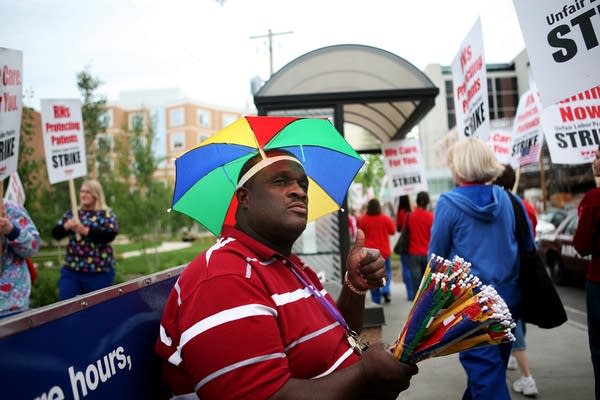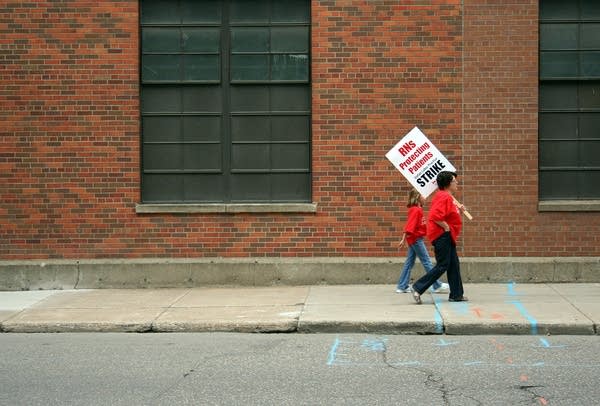Hospitals: Surgeries, births going smoothly during strike

Hospital officials said Thursday that surgeries, childbirths and other procedures were taking place as expected at 14 Twin Cities hospitals while their nurses picketed outside.
Some 12,000 nurses were striking 10 days after their contract expired, to demand the hospitals increase staffing levels and take back proposed cuts to benefits.
To cope with less staff, the hospitals transferred patients to other facilities and also brought in about 2,800 replacement nurses for the day.
"At this point in time, the months of planning for something we hoped would never happen have paid off in substantial ways," said Dr. Penny Wheeler, chief clinical officer for Allina Hospitals & Clinics.
Create a More Connected Minnesota
MPR News is your trusted resource for the news you need. With your support, MPR News brings accessible, courageous journalism and authentic conversation to everyone - free of paywalls and barriers. Your gift makes a difference.

As of late afternoon, the 14 hospitals were taking care of 2,345 patients, a lower number than usual. For example, Abbott Northwestern Hospital in Minneapolis was caring for just under 300 patients this morning, compared to an average of 500 on a typical Thursday, Wheeler said.
Officials said 160 surgeries were being performed Thursday, and 23 babies had already been born. That included a caesarean section at Abbott that happened just as the union nurses were leaving at 7 a.m. The twins were born without complications, Wheeler said.
Some hospitals, including North Memorial in Robbinsdale, were a little busier than usual, but Wheeler said other hospitals reported having more nurses than they needed.
But at Hennepin County Medical Center and other hospitals where nurses weren't on strike, officials reported busier-than-usual conditions.
Dr. Patrick Yoon, an orthopedic surgeon at HCMC said hospitals couldn't operate without any nurses.

"If you follow patients through the system longitudinally, you see nurses in the ward, in post-operative care, and every step along that whole continuum there's nurses potentially involved in that, so it's a huge deal," Yoon said of the strike.
During the course of the day, hundreds of nurses could be seen marching around the hospital, which takes up an entire city block. A bagpipe played and some motorists passing by honked their horns in support.
Nurses walking off the job said they didn't speak with the replacement nurses but left instructions with other hospital staff.
Lori Parks, a cardiac nurse at Abbott, said she felt a little uneasy handing things over without speaking to the nurse who was coming in to replace her. Shortly before Parks left, she had a patient go into a fast heart-rate rhythm.
"We had to start a drip right at a quarter to 7. Then it's like 7 o'clock and they're making us leave so the new nurses can come on," she said. "So you hit start on your drip and you cross your fingers and you leave."

Parks said it appeared the hospital had plenty of doctors on hand -- which she said was frustrating given that she and the other nurses often feel they don't have enough help. The nurses union wants the hospitals to increase staffing levels.
"When we were busy last week we couldn't get any help, and now there are people everywhere," Parks said.
Toni Simmons, an emergency room nurse at St. Joseph's, said there was tension in the atmosphere when she and three other nurses were escorted out the door at 5:30 a.m. Simmons had two more hours remaining in her night shift when hospital staff escorted her out.
"I felt like I was a criminal," said Simmons, who has been a nurse since 1978 and was wearing a button that said "I'll Strike." "It was very uneasy talking to my nurse manager and clinical manager. I felt friction and tension."
But Simmons said she felt she was doing the right thing.

The hospitals and nurses union have been negotiating for weeks on a new contract. But it became clear in recent days that no progress was being made, and that the strike the union scheduled two weeks ago would happen.
Brittany Raul, a cardiac nurse at Abbott who is new to the profession, was learning a lot from the first contract negotiation she's participated in.
"The thought of going through another one of these every three years just blows my mind," said Raul, who said she doesn't think she could work in a stressful hospital setting for decades like some nurses have.
The strike was expected to end at 7 a.m. Friday, but Raul and some other nurses wondered if there might be more action planned in the days ahead if no agreement is reached.
"That's what makes me nervous -- that we're going to go on strike for another day or it's going to be an open-ended strike," she said.

Union officials weren't able to talk about the possibility of another strike until after the one-day strike was over. Hospitals spokeswoman Maureen Schriner said officials aren't aware of any plans for additional strikes.
"What we're really looking for is an opportunity to negotiate," she said. "What we've been facing is this wall" from the national union.
The Minnesota Nurses Association is making some of the same demands about fixed staffing levels that their national affiliate has argued for. The hospitals have said meeting the nurses' demands would be too expensive, and they say their nurse-to-patient ratios are among some of the best in the country.
Dr. Steven Kolar, Chief Medical Officer of HealthEast in St Paul, said the strike hasn't caused the hospitals to reconsider their stance at the bargaining table. And he said his hospital could deal with another strike if it had to.
"I think we're capable of that," Kolar said. "Would we want to? I think it's been hard on all of us, so I'll leave it at that."

At least a few patients expressed support for the nurses, but some were concerned their replacements wouldn't know what to do in an emergency.
Anthony and Alanna Galloway watched the picketers from a window inside the neonatal intensive care unit at Children's Hospital in St. Paul. Their daughter was born March 26 weighing less than 2 pounds and will be in the hospital for another month.
Anthony Galloway said hospital staff prepared his family for the strike.
"They made sure they let us know it was coming and what the time would be as early as they could," he said. "And they ... provided us with lists of her medications. They gave us a list of questions to ask if we see this or that, and they also helped assure us that the nurses coming in were [going to] be neonatal nurses."
Galloway said he has noticed some differences in care. "Usually our nurses are close and respond to every little alarm, change in stats, etc.," he wrote in an e-mail earlier in the day. "Today hasn't been so responsive, but the covering nurses are knowledgeable."
He added, "We are concerned about what will happen if the more serious alarms ring."
But Galloway said he and his wife support the striking nurses. They even taped a sign to the window that read "This baby (heart)'s nurses."
Others receiving care at the hospital didn't know which side to support. Rita Olson, who had brought her 4-year-old son Brent to Children's Hospital in St. Paul on Thursday, said she hopes the contract dispute is resolved soon.
Like Galloway, she was concerned about the quality of Brent's care with his regular nurses off the job.
"They aren't going to get the care that is usually provided to them, the people that know the clients," she said.
At least a hundred replacement nurses wearing scrubs boarded private buses at a downtown St. Paul hotel late this afternoon after working shifts at area hospitals.
"It's been a long day," said one replacement nurse, who declined to provide her name. "That's all I have to say."
Hassan Mohamed Abdi, a cab driver waiting outside the hotel, said he's given rides to several replacement nurses today, all of whom expressed frustration with the situation.
"Lots of unhappy people today," he said. "They keep saying that they want to be at their real jobs. They say that [hospital staff] treat them like they don't trust them."
The strike is scheduled to end at 7 a.m. Friday, but federal mediators haven't scheduled more talks to try to come to an agreement.
(MPR reporters Elizabeth Dunbar, Mark Zdechlik, Madeleine Baran, Rupa Shenoy, and Jessica Mador contributed to this report.)


